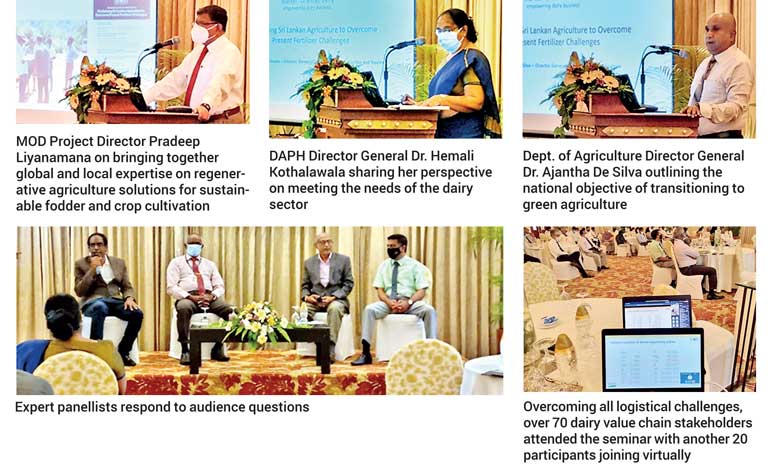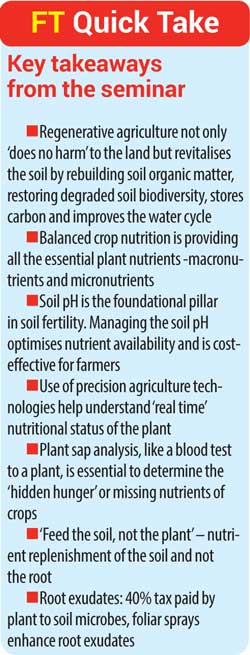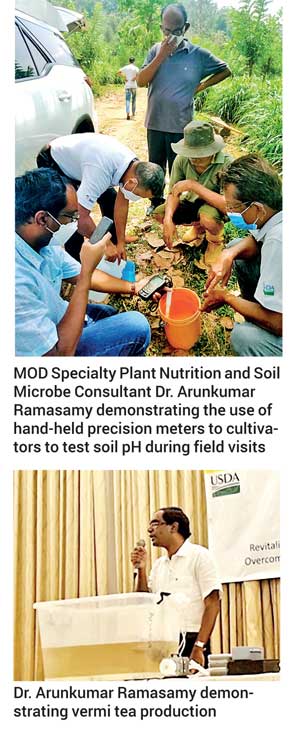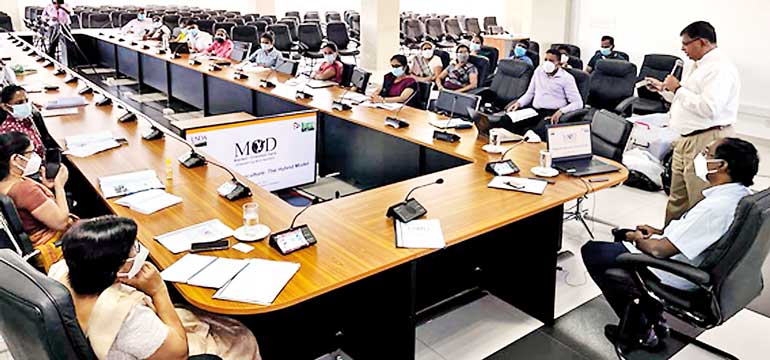Sunday Feb 22, 2026
Sunday Feb 22, 2026
Tuesday, 29 March 2022 00:44 - - {{hitsCtrl.values.hits}}

Dairy development is identified as a national priority to increase access to good quality and affordable fresh milk for consumers, expand rural development and income generation, and reduce dependency on imports. 
The biggest constraint to increasing milk yields continues to be poor animal nutrition due to the lack of consistent quality feed availability year-round. The Market-Oriented Dairy (MOD) Project, as part of its ongoing efforts to build the capacities of dairy farmers and fodder cultivators to ensure sustainable cultivation practices and increase the availability of good quality feed, conducted a thought leadership seminar on ‘Revitalising Sri Lankan Agriculture to Overcome Present Fertiliser Challenges’.
The seminar offered an opportunity for the officials of the Department of Animal Production and Health (DAPH), Department of Agriculture (DoA), the Mahaweli Development Authority, the National Livestock Development Board (NLDB), academia, and the private sector to share global and local best practices and discuss suitable methods for Sri Lankan agriculture to optimise yields.
Setting the stage for productive discussions, DAPH Director General Dr. Hemali Kothalawala emphasised the need of the hour stating that the majority of the 200,000 dairy farmers in the country lack land to cultivate sufficient quantities of quality pasture and fodder.
She added: “To meet the need, pasture and fodder supply will need to come from the commercial sector, and to grow this sector rapidly, we will work together with the DoA to improve the situation and address fertiliser challenges.”
Also present at the occasion, DoA Director General Dr. Ajantha De Silva agreed that his team is committed to supporting the growth of livestock feed production as the country works through the transformation to a green agriculture transitioning from chemical to eco-friendly fertiliser.
Proposing solutions, MOD consultant on Specialty Plant Nutrition and soil microbiome engineering Dr. Arunkumar Ramasamy presented his experience in using regenerative agriculture as a hybrid model to ease the transition to sustainable agriculture.
Dr. Arunkumar asserted that regenerative agriculture is relevant to dairy farmers to convert to a sustainable model mitigating climatic impact and it is especially interesting to policy makers as it helps retain farm productivity and farm livelihood while improving soil fertility by building soil biology, increasing Soil Organic Carbon (SOC) and assisting in Soil Carbon Sequestration (SCS). 
Through his month-long visit covering most of the island and holding conversations with practitioners, academics and officials, Dr. Arunkumar found that the variation in soil pH is critical for an island blessed with water and that variation needs to be addressed to improve nutrient availability for plants.
He also stressed that calcium, the ‘king of crop nutrients’, plays a major role in nutrient transport and is necessary to get a better yield and increase nutrient density, in addition to the macro-nutrients nitrogen, phosphorus, and potassium (NPK), as well as calcium and magnesium. Dr. Arunkumar also shared a basic excel-based calculation methodology to balance the nutrient requirements using a hybrid model.
Sustainable Agriculture Research and Development Centre (SARDC) Additional Director Dr. M.S. Nijamudeen shared local experience in using balanced crop nutrition. Dr. Nijamudeen stressed the importance of an integrated nutrient management system in the transitional phase to maintain fertile soils to ensure national food security, good yields, and healthy foods. He said that it is important to understand how much nutrient the farmer can afford and where and how should they apply it.
Wrapping up the seminar, esteemed panellists Dr. Arunkumar, Dr. Nijamudeen, and Veterinary Research Institute Head Veterinary Research Officer of Pasture and Fodder Crops Dr. W.M.P.B. Weerasinghe participated in a question-and-answer session with the audience moderated by Prof. Emeritus of the University of Peradeniya Prof. Nimal Perera.
Dr. Arunkumar also led a hands-on practical session for practitioners and entrepreneurs interested in organic cultivation and organic fertiliser production, fodder cultivators and extension officers of both public and private sector. The demonstration included tools and techniques for the use of precision meters and cost-effective aerated compost tea brewing techniques. Four companies, as early adopters supplying organic solutions to farmers, had the opportunity to share their product offerings with the audience.
Continuing the collaborative efforts with all stakeholders, the US Department of Agriculture (USDA) funded MOD Project will facilitate the next steps in implementing the recommendations for the dairy sector through the Fodder Committee appointed by DAPH.

Dr. Arunkumar conducted a separate workshop on regenerative agriculture for the officials and staff of the Dept. of Agriculture

MOD Project Director Pradeep Liyanamana said: “Together with our partners across the value chain, we have been able to encourage 60% of the 4,773 trained medium-scale dairy farmers to grow their own fodder, with 137 active commercial fodder cultivators and five silage entrepreneurs supplementing the feed supply gap as per an independent survey conducted in September 2021.”
Cumulatively, over 10,400 harvested hectares, including ratoon crops of better-quality grasses such as CO3, CO4, and super napier varieties, have been grown across 17 districts using improved techniques and technologies thanks to MOD technical support.
“With the recent regulatory changes in relation to the use of fertiliser, we have continued to encourage entrepreneurship amongst our dairy farmers who have started making organic compost for their own use as well as for sale to others,” added Liyanamana.
Regenerative Agriculture best practices recommendations:
lRight source – match fertiliser type to crop needs
lRight rate – match amount of fertiliser to crop needs
lRight time – make nutrients available when crops need them
lRight place – provide nutrients where crops can use them
lVermicompost, vermi tea is recommended as an organic input at periodic intervals
lBenefits of compost/vermi tea – easy to make, economical, plant health, biological fixation of nitrogen and biofertilisation, improvement of soil carbon content, increase the number of microorganisms
IESC’s (www.iesc.org) Market-Oriented Dairy Project (www.market-oriented-dairy.org) is funded through the USDA Food for Progress Program (www.fas.usda.gov/programs/food-progress), and collaborates with sub-partners University of Florida (www.ufl.edu), Sarvodaya (www.sarvodaya.org), and the Global Dairy Platform (www.globaldairyplatform.com).
IESC provides highly experienced industry and technical experts to deliver technical assistance to dairy entrepreneurs. Since 1964, IESC has set the standard for fielding expertise, including volunteers, to support enterprise growth in developing countries and emerging markets.